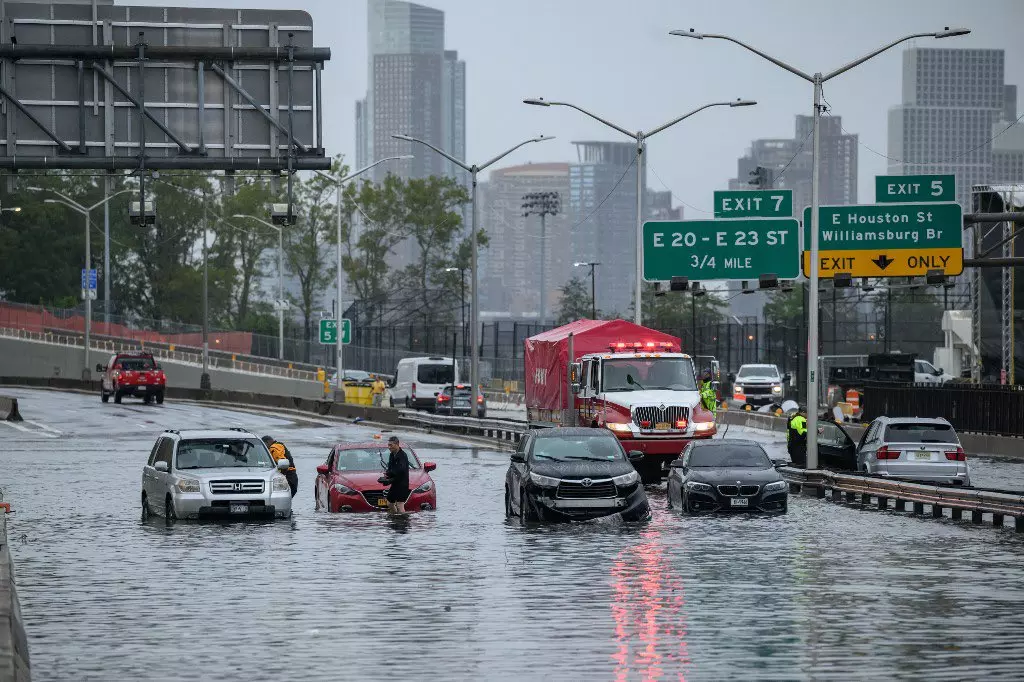
The rush-hour rains flooded the streets and highways and shut down parts of the subway system. Image: X
New York: State of emergency as rainstorm floods roads, subways, airport
No storm-related deaths or critical injuries had been reported as of midday, city officials said

A potent rush-hour rainstorm swamped the New York metropolitan area on Friday (September 29), shutting down parts of the city's subway system, flooding streets and highways, and delaying flights into LaGuardia Airport.
Up to 5 inches (13 centimeters) of rain fell in some areas overnight, and as much as 7 inches (18 centimeters) more was expected throughout the day, New York Gov. Kathy Hochul said on Friday morning (September 29).
By midday, although there was a break in the clouds, Mayor Eric Adams urged people to stay put if possible.
“It is not over, and I don't want these gaps in heavy rain to give the appearance that it is over,” he said at a news briefing. He and Hochul, both Democrats, declared states of emergency.
No storm-related deaths or critical injuries had been reported as of midday, city officials said. But residents struggled to get around the waterlogged metropolis.
Traffic hit a standstill, with water above cars' tires, on a stretch of the FDR Drive — a major artery along the east side of Manhattan. Some drivers abandoned their vehicles.
Priscilla Fontallio said she had been stranded in her car, which was on a piece of the highway that wasn't flooded but wasn't moving, for three hours as of 11 am. “Never seen anything like this in my life,” she said.
On a street in South Williamsburg, Brooklyn, workers were up to their knees in water as they tried to unclog a drain while cardboard and other debris floated by.
As the rain briefly slowed, Brooklyn residents emerged from their homes to survey the damage and begin draining the water that reached the top of many basements’ doors.
Waist-deep water in some streets
Some people arranged milk crates and wooden boards to cross the flooded sidewalks, with water close to waist-deep in the middle of some streets.
High school student Malachi Clark stared at a flooded intersection, unsure how to proceed as he tried to get home to Brooklyn's Bedford-Stuyvesant neighbourhood. He had tried to take a bus, then a train.
“When it stops the buses, you know it's bad,” he said. (Bus service was severely disrupted citywide, according to the Metropolitan Transportation Authority.)
A Brooklyn elementary was evacuated because its boiler was smoking, possibly because water got in, Schools Chancellor David Banks said at the news briefing.
Environmental Protection Commissioner Rohit T. Aggarwala said that over 2.5 inches (6 centimeters) of rain fell in a single hour at the Brooklyn Navy Yard, overwhelming the surrounding drainage systems.
Water poured into subways stations, basements
Elsewhere, photos and videos posted on social media showed water pouring into subway stations and basements.
Dominic Ramunni, a meteorolgist at the National Weather Service in New York, said by phone that Friday's rains were due to a coastal storm, with low pressure off the East Coast helping to bring in some deep moisture from the Atlantic Ocean.
“This will be one of the wettest days in quite some time,” he said.
Virtually every subway line was at least partly suspended, rerouted or running with delays, and two of the Metro-North Railroad's three lines were suspended.
Flights into LaGuardia were briefly halted on Friday morning (September 29) and then delayed, because of water in the airport's refuelling area. Flooding also forced the closure of one of the airport's three terminals.
Towns and cities around New York City also experienced flooding, including Hoboken, New Jersey.
‘We have to get used to this, due to climate change’
The deluge came less than three months after a storm caused deadly floods in New York's Hudson Valley and left Vermont's capital, Montpelier, submerged.
A little over two years ago, the remnants of Hurricane Ida dropped record-breaking rain on the Northeast and killed at least 13 people in New York City, most of whom were in flooded basement apartments. Overall, 50 people died from Virginia to Connecticut.
New York City officials said they received reports of six basement apartments that had flooded, but all the occupants got out safely. Hochul pleaded with residents to evacuate their homes if the water started to rise.
“People need to take this extremely seriously,” the governor said.
Hochul warned New Yorkers on Thursday night (September 28) of a forecast that called for 2-3 inches (5-7.5 centimeters) of rain, with 5 inches (13 centimeters) or more possible in some places.
“We anticipate, we warn, we prepare. But then when it hits and you have 5 inches in the last 12 hours — 3 in the last hour this morning — that's a scale that we're not accustomed to dealing with,” the Democrat told TV station NY1 on Friday (September 29).
But she added that New Yorkers “have to get used to this” because of climate change.
As the planet warms, storms are forming in a hotter atmosphere, making extreme rainfall more frequent, according to atmospheric scientists.
(With agency inputs)

